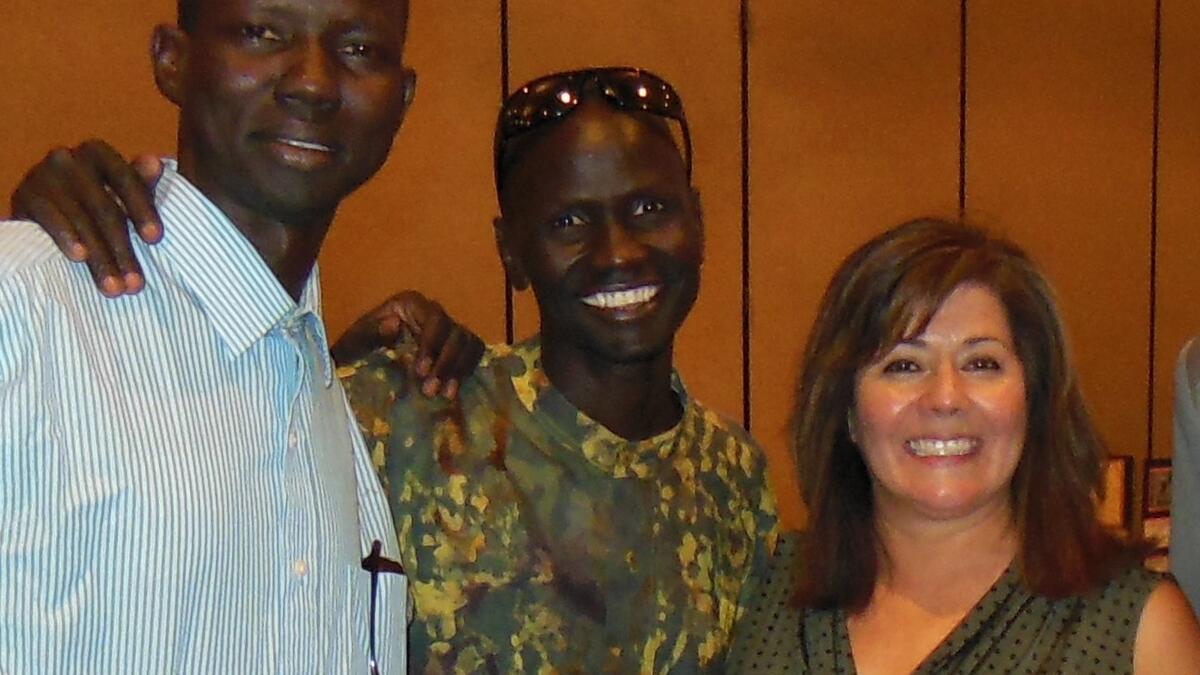Project preserves oral histories of Sudan's Lost Boys

Some of the most tragic – and inspiring – stories of the 20th century are being permanently preserved and made available worldwide by an Arizona State University faculty member, with assistance from her students and ASU librarians, along with support from two grants.
The Lost Boys of Sudan are the epitome of the term “survivor.” These men (and women) were separated from their families as children and driven out of their homeland during a bloody, generation-long civil war in Sudan that began in 1983. The brutal conflict claimed the lives of approximately 1.9 million people and displaced and orphaned nearly 23,000 Sudanese boys and girls, according the U.S. Committee for Refugees.
“The story of the Lost Boys is a human story,” said Julie Amparano, who teaches courses including Cross-Cultural Writing for ASU’s New College of Interdisciplinary Arts and Sciences, the core college on the West campus. “It is the story of children, war, divided communities and the resilience of the human spirit.”
Arizona is the largest relocation center for Lost Boys. One of them, Santino Chol, enrolled in a class taught by Amparano some five years ago. Chol’s arrival on the West campus was the spark that led to the creation of Amparano’s “Lost Boys Found” project.
Through the project, more than a dozen videotaped oral histories of Lost Boys have now been recorded, along with a compilation of approximately 40 short written biographies from Lost Boys and Girls in Arizona, and the numbers continue to grow.
“Since meeting Santino, I have met many Lost Boys with incredible tales of courage, hope and perseverance,” Amparano said. “They told harrowing tales of raids on their villages; walks that lasted months through scorching deserts to reach refugee camps that could provide them with a mere cup of grain a day; friends and family lost along the way. Then, there are stories of hopes and dreams come true. One Lost Boy completed a master’s degree in social justice and human rights from ASU. Another is a marathon runner and hopes to compete in the Olympics one day. Santino returned to Sudan and found his mother.”
Spurred to action by a desire to avoid having these historically significant stories lost to future generations, Amparano began work to document them. She could have recorded interviews on audiotape, but she concluded that the world needed not only to hear from the Lost Boys, but also see these men and women tell their stories.
Doing so meant expanding her own base of knowledge and skills to include videotaping and archiving. Amparano applied for and received grants from the Arizona Humanities Council and the Social Justice Fund, enabling her to assemble a team of students – Arthur Morales and Harper MacNeill – who knew how to videotape, edit film and compress it in a way that would allow people around the world to view it.
Morales’ oral history with a Lost Boy, Tut, went on to win first place in New College’s Undergraduate Student Research and Creative Projects Expo in 2012. He completed his bachelor’s degree in English last May and is now pursuing a Master of Arts in Interdisciplinary Studies (MAIS) degree through New College.
“After interviewing Tut and hearing how he faced loss, fear and hopelessness, I knew that I wanted to continue archiving oral histories on the Lost Boys of Sudan,” said Morales, who aspires to earn a doctorate and become an English professor. “I have learned so much from this experience. It has made me come to appreciate the freedoms we all have in the United States. I also learned that we all have a story to share.”
The stories of the Lost Boys being compiled by Amparano and her students are now literally being shared around the world. That’s thanks to the involvement of ASU librarians, including Dennis Isbell and Mimmo Bonanni, who assisted in making these oral histories available through the ASU Digital Repository.
Adding the “Lost Boys Found Oral Histories” to the ASU Digital Repository has several benefits, Bonanni said.
“It will make the videos and documents of this important collection accessible to researchers worldwide, through ASU Libraries One Search, the ASU Digital Repository and from Google,” he explained. “The collection will be preserved and archived in the repository, with unique persistent identifiers, ensuring that the oral histories will be accessible well into the future. In addition, each record in the collection is richly described, including title, subject, and notes, which can be exported and cited in research papers and works. And the images, documents and videos can be viewed from within the repository, making them easily accessible from any web browser.”
While Amparano continues to collect oral histories from Lost Boys, she is also working on spreading their stories through other forums. She will report on her work during the Southwest Oral History Association conference in April and perform a short play based on the interviews in May at the Herberger Lunchtime Theater in Phoenix, with a full production at the Kerr Cultural Center in Scottsdale planned for the fall.
“The Lost Boys Found project aims to preserve knowledge for future generations and showcase research findings, which is central to ASU’s mission,” Amparano said. “And it is consistent with our commitment in New College to reach out to the community in meaningful ways.”
The play that Amparano is writing about the Lost Boys isn’t her first. She was nominated for an ariZoni award for her play “A Mother’s Will,” which chronicled a Hispanic family dealing with the impending death of their mother.
Amparano has been teaching creative writing and ethnic studies courses for SHArCS since 2005. She is the publisher of New College’s Canyon Voices literary magazine (CanyonVoices.asu.edu), co-editor of Trivia: Voices of Feminism (TriviaVoices.com) and the author of a children’s book, “America’s Latinos: Their Rich History, Culture and Traditions.”